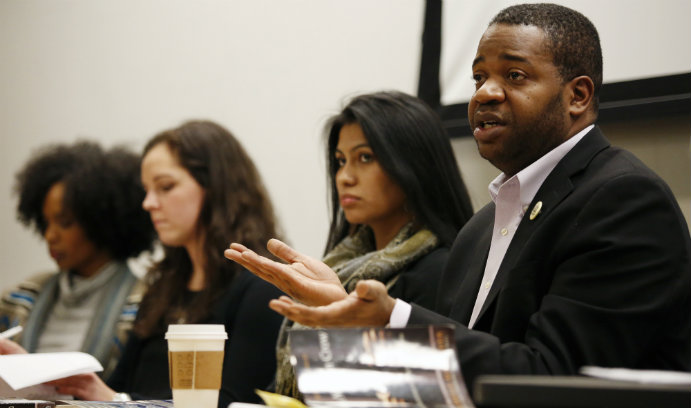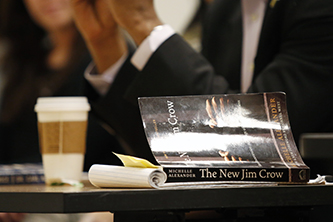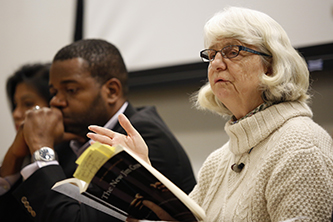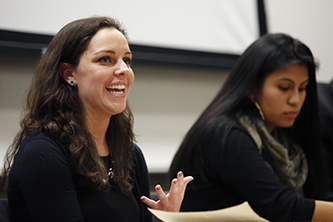‘A topic of great significance’

James Peterson, associate professor of English and director of Africana Studies, discussed "The New Jim Crow."
Since the beginning of our nation’s War on Drugs, America’s prison population has increased dramatically. A disproportionate number of those prisoners are African American.
In her book, The New Jim Crow: Mass Incarceration in the Age of Colorblindness, Michelle Alexander addresses what she calls the redesigned racial caste system in America. Alexander, a highly acclaimed civil rights lawyer, advocate and legal scholar, describes how, in this “era of colorblindness,” Americans use the criminal justice system to “engage in all the practices we supposedly left behind” after the abolition of slavery and the end of Jim Crow.
Alexander delivered the keynote address for Lehigh’s MLK Celebration on Jan. 28 in the Zoellner Arts Center’s Baker Hall. In preparation for her visit, a group of Lehigh faculty, staff and students, each profoundly affected by The New Jim Crow, discussed the book Jan. 22 in a forum at STEPS titled “Crime, Race and Injustice - Lehigh Responds to The New Jim Crow.”
“The book has received stellar reviews and provoked serious conversations about the role of race in the criminal justice system, not only by scholars and even general readers, but perhaps most importantly by legal professionals: judges, prosecutors and defense attorneys,” said the panel’s moderator, Lloyd Steffen, professor of religion studies, University Chaplain, and co-chair of Lehigh’s MLK Committee.
“We invited [Alexander] here in the belief that her message is the MLK message, that were King alive today, he would be leading the charge against the War on Drugs and policies that have placed blacks not only at a social and economic disadvantage, but placed them in a system—what Alexander calls a caste system—from which, once in, they cannot escape,” said Steffen.
Sharon Wiles-Young, director of Library Access LTS, praised the book, which she said “effectively chronicles the mass incarceration of African Americans in the United States by weaving together well-documented statistics and data, U.S. case law, constitutional law, federal and state policies, and personal narratives that really help to frame the issue.”
After reading the book, Wiles-Young was compelled to start talking to people about what she’d learned. “It was amazing to hear what bits and pieces we all knew, but not the depth of the problem. This book just kept disturbing and upsetting me, especially given what’s going on in our cities and our communities.”
James Peterson, associate professor of English and director of Africana Studies, said, “This is obviously a topic of great significance to our nation and to our world, and for me personally and professionally.”
He praised the work of the MLK Committee, commending the group’s continued dedication to raising awareness around social justice issues.
“Very rarely will a theme or topic be sustainable on a university campus in the way that the MLK Committee has committed itself to this issue,” said Peterson. “When you look at the slate of things we’ve been able to do over the last couple of years, it really makes the case for having a sustained commitment to social justice issues.”
Peterson said he was “honored and humbled” to have two of his students, Brenda Martinez ’15 and Kara Falcone ’15, on the panel. “When you discover something like The New Jim Crow, when you come into contact with a piece of information that is life-changing and can irrevocably change people’s perspectives on how we see our society, your job as an educator is to share that with students and to inspire them.”
Martinez and Falcone were certainly inspired.
Martinez, who grew up in South Central Los Angeles and continues to work with youth there, said the book has had a profound impact in Los Angeles public schools. “[After reading the book] we have men of color, young boys of color finally starting to realize there is a system playing against us,” said Martinez. “We know what’s going on, we know that a lot of our friends are off selling drugs or going to jail. We see everything. But this book was able to articulate it and was able to show the history and really connect everything from slavery up until what we’re doing today.”
Martinez hopes to connect what she’s learned from Alexander’s book to deportation and immigration issues.
Falcone, who is studying to be a teacher, stressed the importance of acknowledging and discussing these issues as well as addressing personal bias, particularly among educators.
“If I hadn’t taken Dr. Peterson’s class, I would have a totally different perspective on a lot of things that I’m now considering at the top of my priority list when I’m going into teaching,” said Falcone.
“Educators go into a pipeline with biases but are left unchecked,” said Peterson. “There’s so much more work to do on that particular front – it’s about educating people about biases and the relationship between public education and the criminal justice system, but it is also about challenging teachers to root out their own biases.”
Monica Miller, assistant professor of religion studies and Africana Studies and director of Women, Gender and Sexuality Studies, described The New Jim Crow as “a consciousness-raising book, one that will have you thinking really differently about American politics.”
“There’s no way you could read a book like this and not be persuaded that we have a really big problem on our hands. Perhaps it might require one of the biggest mass social movements we have ever seen. You can finish reading a book like this and think to yourself, ‘Well, what can I do?’ because the problem is in fact so very big. Just having the conversation is really important.”
Story by Kelly Hochbein
Photos by Stephanie Veto
Posted on:




